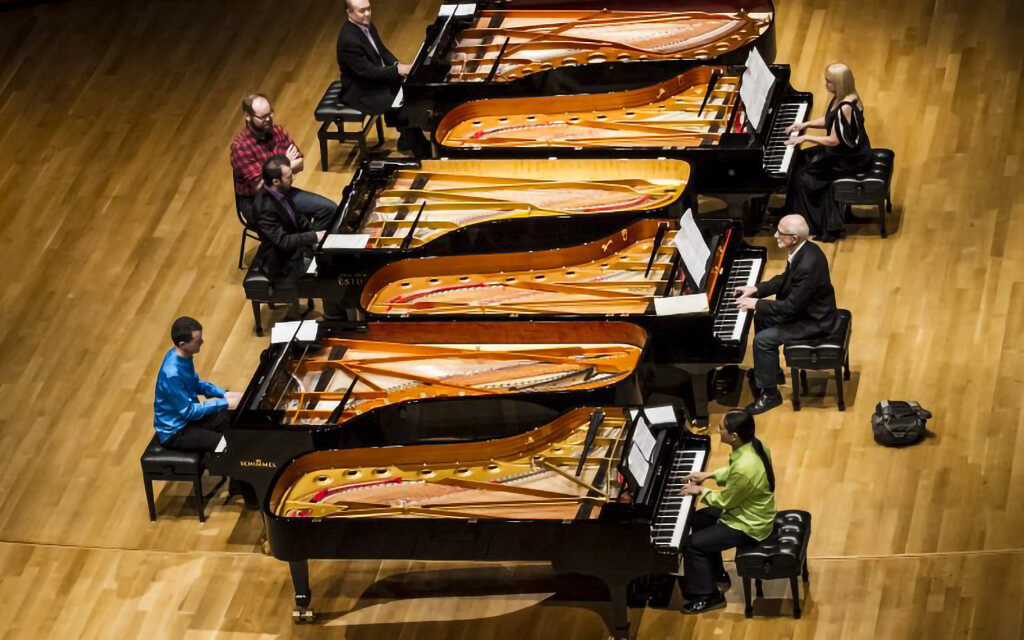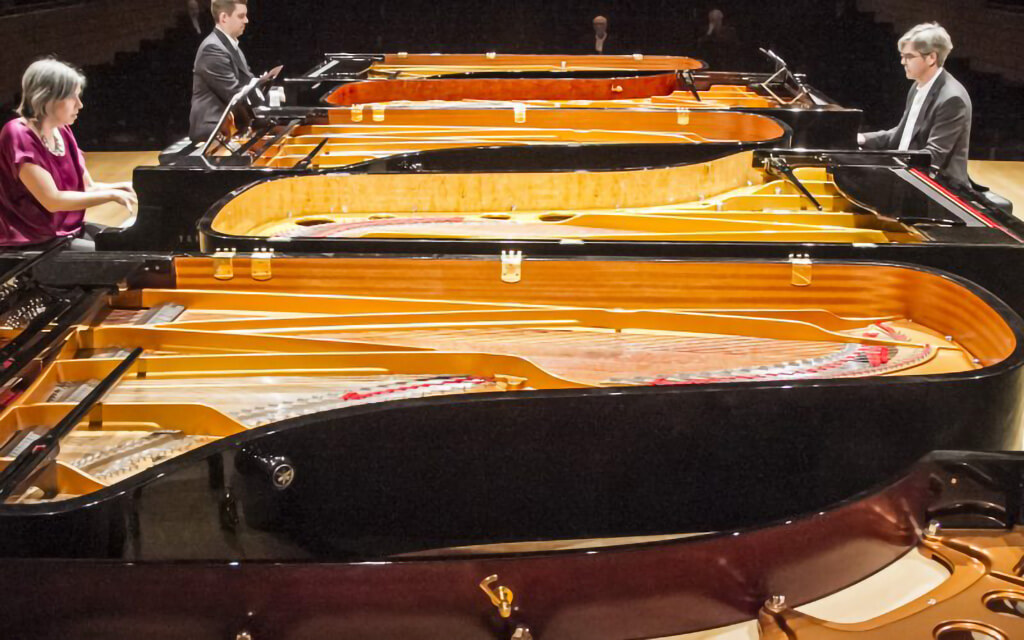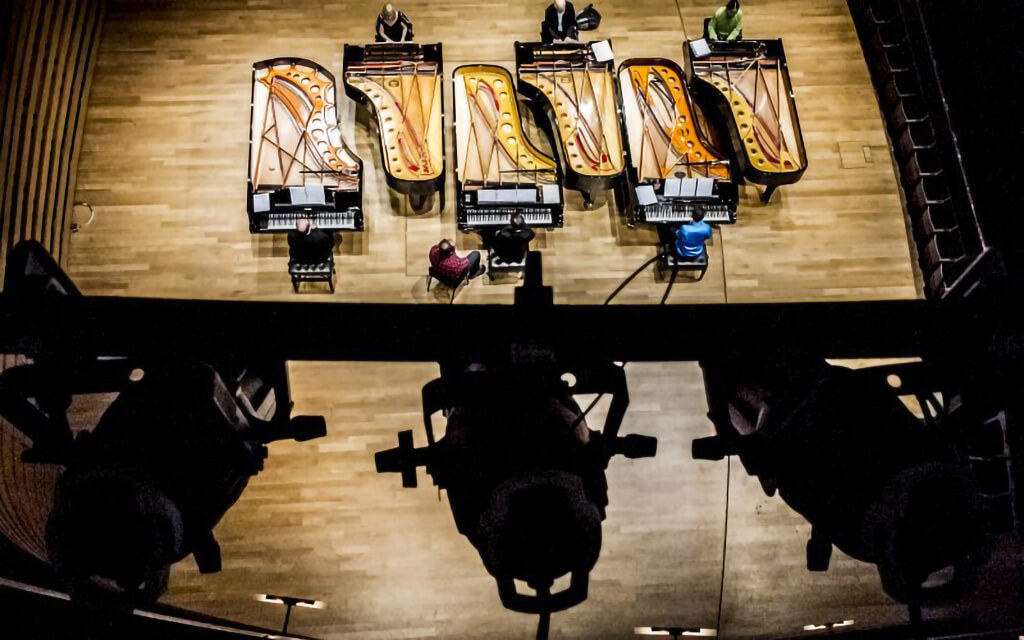
For a typical classical piano concert, one would imagine a single grand piano with its lid open, its brilliant inside encased in silky, heavy blackness. Sometimes, there are two pianos — there are a handful of orchestral and chamber two-piano favourites that are programmed regularly. But six pianos?
Yes, please!
On October 12, 2018, 6 Steinway concert grands will fill out the Koerner Hall stage, under the Soundstreams’ season opener: Six Pianos. Featuring a mix of Toronto pianists and percussionists: Russell Hartenberger, Ryan Scott, Greg Oh, Jamie Parker, Stephanie Chua, Midori Koga and Radka Hanáková, the program is built on Steve Reich’s Six Pianos, and features John Cage’s The Beatles 1962-1970, along with smaller scale multi-piano works (Lutosławski, Alexina Louie, Juliet Palmer), and a newly commissioned work by virtuoso pianist/composer André Ristic: Variations on Vivaldi.
Six Pianos was Reich’s dream project, realized at the Baldwin Piano studio in New York in 1973, and Russell Hartenberger was one of the musicians who witnessed and interacted with the evolution of the piece:
“He wanted to write a piece for all of the pianos in a piano store… so he kept paring it down and paring it down, until it ended up Six Pianos.”
Lawrence Cherney (Artistic Director, Soundstreams) also finds six pianos a magical combination:
“The sound of 6 nine-foot pianos is just about wonders of the world. I always loved the sound of multiple pianos, and it was six that the average human ear can distinguish… We’ve done multiple pianos a few years ago with Six Pianos, so we tried to bring something new to this format — this time, we have a new commission with André.”
The logistics for such a concert is quite different from the norm. As most concert halls have just two pianos (larger international halls may have up to four, often varying in size), the main challenge lies in sourcing the pianos that can be matched successfully. Luckily, Steinway Piano Gallery, Toronto, is providing six concert grand pianos; the rehearsals for Reich are taking place at the Steinway Piano Gallery in Markham.

And how do pianists feel about the piano-exclusive ensemble format? Most pianists work alone, or in chamber groups consisting of other instruments. Even in professional musical training, while string, wind and brass instrumentalists are placed in appropriate large ensembles, (guitarists are usually sent to guitar ensembles) and vocalists into choirs, pianists — well, they are usually sent to choirs (even if the pianist has never sung and does not want to sing), as multi-piano ensembles are quite rare, even professionally. There are only a handful of 4-piano quartets and 6-piano groups in the world.
Stephanie Chua remembers the excitement she felt when she was approached for Six Pianos. As co-founder of juntQin keyboard collective, Stephanie is no stranger to multi-keyboard works; she was also part of the Music for 18 Musicians performance for Reich at 80 at Massey Hall (2016). So, when Lawrence approached her about Six Pianos, she jumped on board right away:
“It’s very special to work on these pieces with Russell, as he was there for the conception of these works and has had a long collaborative relationship with Reich… and I’ve done many works for multi-keyboards, but never anything on this scale. I look forward to sharing the stage with so many fantastic pianists!”
For Greg Oh, this is the third time he’ll be performing the SP, and as a seasoned performer of this work, Greg is particularly fascinated with his own evolution with the piece:
“… It gets incrementally more fun with each iteration. I think that this work and many of Reich’s other works are skewed towards the experiential. Unlike works that are fun to pull apart and analyze and hum while washing dishes, for me, Six Pianos exists only in the performative moment… The challenge for the performer is managing two states of being: one must be conscious of the notes, the precision of the notes and the time and pacing and fitting in, while simultaneously suppressing any thoughts of control or ego. Rather than “Just Do It,” it’s more like “Just Let It Happen.” The biggest danger in this piece is getting in one’s own way.”
Midori Koga and Jamie Parker, and percussionists Russell Hartenberger and Ryan Scott, will be joining Stephanie and Greg on the pianos for SP.
For companion pieces, Soundstreams chose Cage’s The Beatles 1962-1970 (1989), one of the few original compositions for 6 pianos, full of quotes from popular Beatles tunes, Lutosławski’s Variations on a Theme by Paganini (1941), and Louie’s Afterimages (1981), to reflect the old, and Palmer’s Five (2008), written for Greg’s eclectic ensemble, Toca Loca, and Ristic’s new commission work, Variation on Vivaldi (2018) for six pianos (Radka Hanáková will take Russell’s bench), to represent the new.

For André Ristic, this new commission is a fusion of a few different fascinations in his life. As a teenager (and 30 years on and counting!), André first heard the Bach’s Concerto for Four Harpsichords, BWV 1065 and was floored:
“… I’ve been sort of obsessed with (BWV 1065) since I was about 15–16 years old, and I believe this is the one of the most successful harmonic and melodic pieces in history. Then I learned that in fact, Bach transcribed it from the Concerto for Four Violins by Vivaldi (RV 580). With the years, many elements appeared to me in this simple and short piece… I’ve made a few arrangements of it, and have performed it a few times myself. It is repetitive; however, there is a lot of math/combinatorics in it — though these calculations are somewhat secondary to the musical effect.”
Another interesting element in André‘s creative process is the actual commission process:
“… Perhaps 75% of what I compose now comes from commissioning agreement, and I am used to adapting to any instrumentation – as long as they are realistic for me. In this case, within the first 2 minutes of discussion, I knew what I wanted to do: I have a strong preference for groups of like-instruments, for instance, pieces for eight flutes, four cellos, 15 brass. It allows me to create sonic illusions and to create instrumental phantasms, such as having these six pianists play simultaneously the whole register of the piano by distributing the notes between them.”
Set for six pianos, with six pianists, there will also be a big nod to Reich in the music — through repetitive techniques such as phasing, chord repetition and unison canons- an homage from André.
Six Pianos — it promises to be a night of a spectacle — to see and to hear:
“… To be inside that sound (of six pianos) is a wonderful experience, playing these repetitive patterns is a really magical sound. Coming to a Steve Reich concert the audience might think: ‘well, this is going to be harsh, or just a lot of rhythms and not much melody,’ but the timbre of six pianos is really glorious. There is something about the lush sound of six pianos that kind of rolls over you – it’s a beautiful experience.” — Russell Hartenberger
————————————–
Soundstreams presents:
Six Pianos
12 October 2018, 8pm,
Koerner Hall, 273 Bloor St. West, Toronto
- CRITIC’S PICKS | Classical Music Events You Absolutely Need To See This Week: April 15 – April 21 - April 15, 2024
- SCRUTINY | Laurie Anderson Entrances A Sold-Out Koerner Hall With A Journey Down The Rabbit Hole - April 8, 2024
- CRITIC’S PICKS | Classical Music Events You Absolutely Need To See This Week: April 8 – April 14 - April 8, 2024



